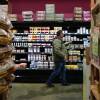In the past decade or so, we've gotten used to jobless recoveries, when the economy grows its way out of a recession without adding many new jobs.
At the moment, we may be living through the opposite of a jobless recovery. In the past few months, job growth has picked up, while economic growth has slowed.
Lots of smart people are trying to figure out what this means.
David Leonhardt argues that it means job growth is likely to slow down sometime soon:
...the jobs report isn't the only measure of economic activity, and another major measure — of gross domestic product — doesn't look quite so cheerful. The most likely situation is that job growth will slow in coming months, economists say ...On Friday, Macroeconomic Advisers, one of the most closely watched forecasting firms, reduced its estimate of economic growth in the current quarter to an annual rate of 1.8 percent, from 2 percent. And 1.8 percent growth does not generally lead to very strong job growth.
We may be seeing job growth at the moment because the whole lean, productivity-growth thing has gone so far that employers realize they need to start hiring again, even if economic growth is slowing down. Ezra Klein writes:
[Maybe] the confidence fairy has come for a visit. Businesses are very, very lean right now. Perhaps a little too lean. One possibility is that many employers have come to the conclusion that their payrolls are lower than even the weak economy justifies, and the employment bounceback is a function of them hiring to reach a level they should already be at.
Indeed, companies are hiring so much now in part because they fired so many people during the recession, Christina Romer tells the WSJ.
"Firms were terrified," she says. "We had just had the first financial crisis in 70 years. The world looked like it was falling apart, and they had no idea how or when this thing was going to end." Over the past six months, she continues, as fear and uncertainty have dissipated, firms appear to have reversed course and gone back toward more normal staffing levels.
Still, Romer — and fellow former White House economist Jared Bernstein — both argue that job growth won't keep up for long unless economic growth picks up as well.
Then again, maybe economic growth is already higher than everyone thinks.
Economists are notoriously bad at estimating GDP in real time. Even the government's own initial estimates, released a month after each quarter ends, are off by an average of 1.3 percentage points. That's a huge gap, given that average GDP growth is 3 percent.
During the downturn, the economy shrank much more quickly than initial estimates suggested. Maybe now, economic growth is higher than we think.
In any case, this thing that appears to be happening — high job growth, slow economic growth — needs a name that's just as catchy "jobless recovery."
Karl Smith calls it a GDP-less recovery, which is a bit wonky. We put a call out for ideas on Twitter this morning and got some promising candidates:
- jobful recovery, via @betseystevenson
- growth-free recovery — "has the added benefit of sounding like a type of organic poultry label," via @jimtankersley
- growthless recovery, via @greenideas
- hunter-gatherer recovery — "everyone has a job scrounging for food/shelter," via @greger1
Planet Money Question of the Day:Copyright 2016 NPR. To see more, visit http://www.npr.org/.



